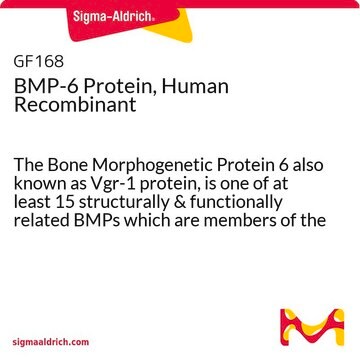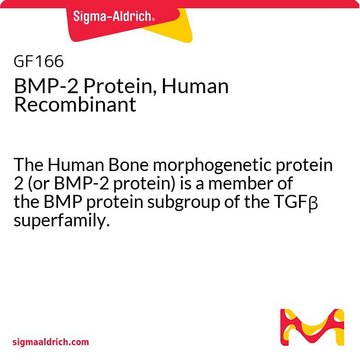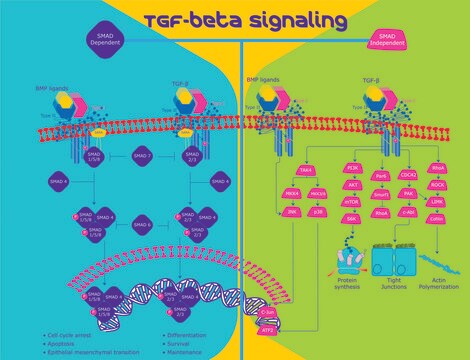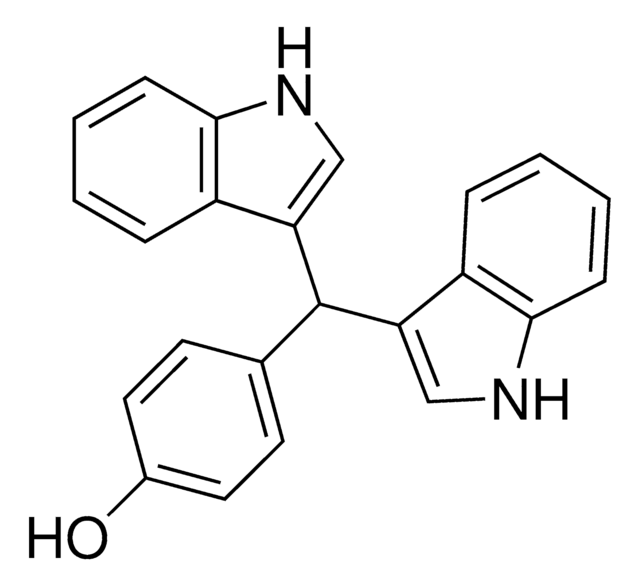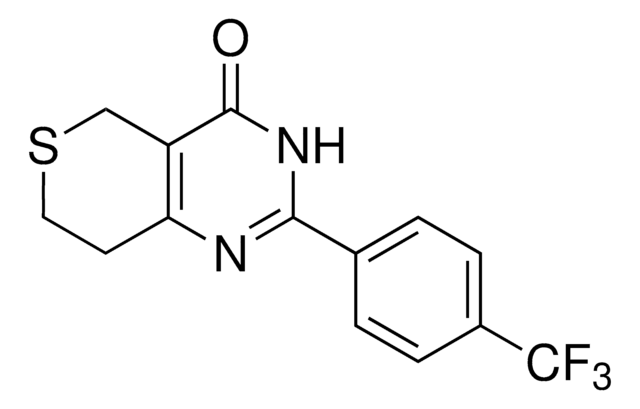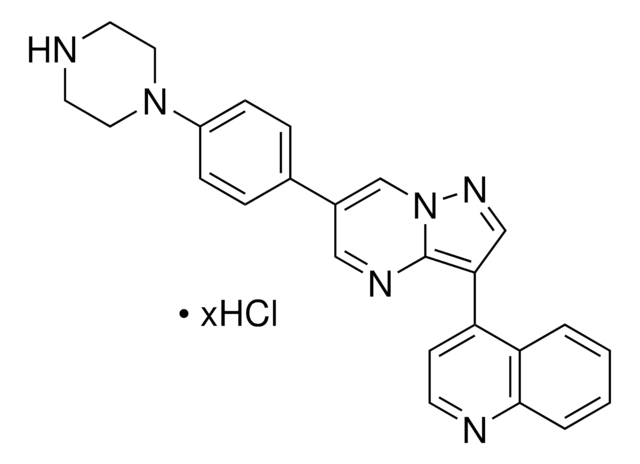SRP3017
BMP-6 human
recombinant, expressed in HEK 293 cells, ≥95% (SDS-PAGE), ≥95% (HPLC), suitable for cell culture
Synonyme(s) :
VGR
Se connecterpour consulter vos tarifs contractuels et ceux de votre entreprise/organisme
About This Item
Code UNSPSC :
12352202
Nomenclature NACRES :
NA.32
Produits recommandés
Source biologique
human
Produit recombinant
expressed in HEK 293 cells
Essai
≥95% (HPLC)
≥95% (SDS-PAGE)
Forme
lyophilized
Puissance
0.03-0.06 μg/mL ED50
Poids mol.
26.2 kDa
Conditionnement
pkg of 10 μg
Technique(s)
cell culture | mammalian: suitable
Impuretés
<0.1 EU/μg endotoxin, tested
Numéro d'accès UniProt
Conditions d'expédition
wet ice
Température de stockage
−20°C
Informations sur le gène
human ... BMP6(654)
Description générale
BMP6 (bone morphogenetic protein 6) is one of the BMPs which are secreted signaling proteins belonging to the transforming growth factor-β (TGF-β) superfamily. This gene is localized to human chromosome 6p24.1.
Recombinant human BMP-6 is a 26.2kDa homodimeric glycoprotein consisting of two 117 amino acid subunits, which correspond to amino acid residues 397 to 513 of the full-length BMP-6 precursor.
Recombinant human BMP-6 is a 26.2kDa homodimeric glycoprotein consisting of two 117 amino acid subunits, which correspond to amino acid residues 397 to 513 of the full-length BMP-6 precursor.
Actions biochimiques/physiologiques
BMPs (bone morphogenetic proteins) were initially identified from demineralized bone extracts capable of stimulating endochondral osteogenesis at extraskeletal sites in vivo. BMP6 is thought to be involved in early embryogenesis. In hepatocellular carcinoma (HCC) the expression of this protein is suppressed due to hypermethylation, and this is linked with poor patient outcomes. This protein is also down-regulated due to CpG island methylation in CRC (colorectal carcinoma), although it is not yet been found to be linked with tumor progression or prognosis. BMP6 is involved in chondrocyte differentiation, and in fetal kidney and urinary system development. It is thought to be involved in ovulation, where it elevates the accumulation of neutrophils in ovulatory follicles and reduces the influence of protease inhibitors.
Séquence
VSSASDYNSS ELKTACRKHE LYVSFQDLGW QDWIIAPKGY AANYCDGECS FPLNAHMNAT NHAIVQTLVH LMNPEYVPKP CCAPTKLNAI SVLYFDDNSN VILKKYRNMV VRACGCH
Forme physique
Lyophilized from 10 mM Tris, pH 9.0.
Reconstitution
Centrifuge the vial prior to opening. Reconstitute in water to a concentration of 0.1-1.0 mg/ml. Do not vortex. This solution can be stored at 2-8°C for up to 1 week. For extended storage, it is recommended to further dilute in a buffer containing a carrier protein (example 0.1% BSA) and store in working aliquots at -20°C to -80°C.
Code de la classe de stockage
11 - Combustible Solids
Classe de danger pour l'eau (WGK)
WGK 3
Point d'éclair (°F)
Not applicable
Point d'éclair (°C)
Not applicable
Faites votre choix parmi les versions les plus récentes :
Déjà en possession de ce produit ?
Retrouvez la documentation relative aux produits que vous avez récemment achetés dans la Bibliothèque de documents.
Les clients ont également consulté
Genetic dissection and prognostic modeling of overt stroke in sickle cell anemia.
Sebastiani P et al
Nature Genetics, 37(4), 435-440 (2005)
Hypermethylation leads to bone morphogenetic protein 6 downregulation in hepatocellular carcinoma.
He Y et al
PLoS ONE, 9(1), e87994-e87994 (2014)
The role of bone morphogenetic protein 6 in accumulation and regulation of neutrophils in the human ovary.
Akiyama I et al
Reproductive Sciences, 21(6), 772-777 (2014)
Expression of BMP6 is associated with its methylation status in colorectal cancer tissue but lacks prognostic significance.
Sangplod P et al
Asian Pacific Journal of Cancer Prevention, 15(17), 7091-7095 (2014)
S M Lens et al.
Seminars in immunology, 10(6), 491-499 (1998-11-25)
In contrast to the expression of other TNFR/TNF family members, expression of CD27 and its ligand CD70 is predominantly confined to lymphocytes. High expression levels of CD27 appear to be dependent on proper ligation of antigen receptors, whereas for the
Notre équipe de scientifiques dispose d'une expérience dans tous les secteurs de la recherche, notamment en sciences de la vie, science des matériaux, synthèse chimique, chromatographie, analyse et dans de nombreux autres domaines..
Contacter notre Service technique